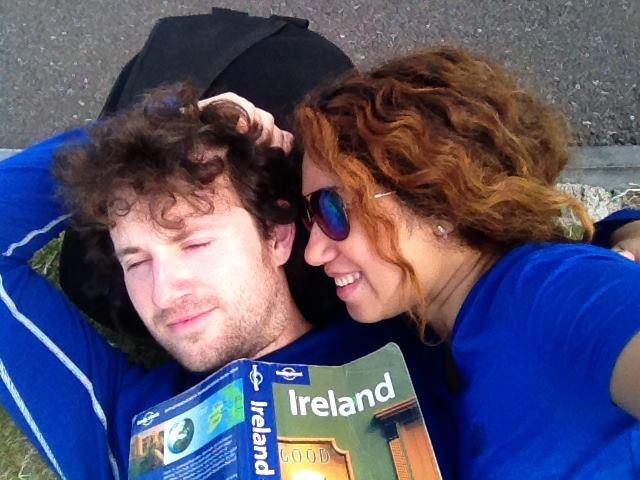12 Tips For Evading Costly Land Border Crossing Scams In Southeast Asia
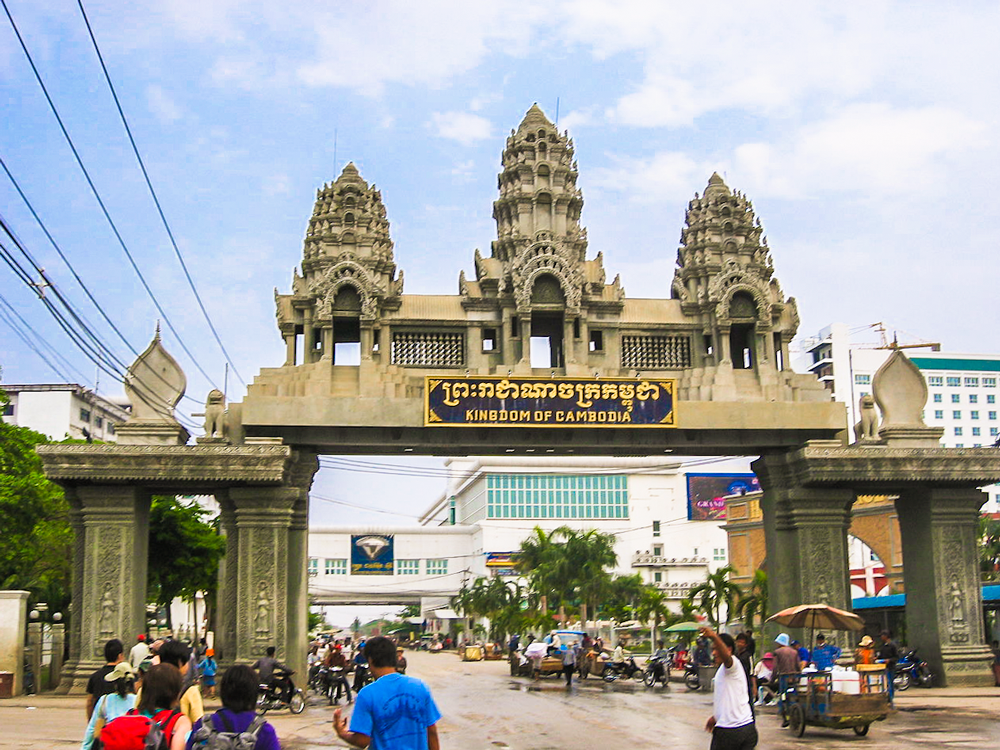
If you’re travelling around Southeast Asia, the numerous land border crossings that are found throughout the region are often a great way to avoid expensive airfares when transitioning into neighbouring countries.
Indeed, they can even make for an interesting travel experience in their own right.
Between the passport control counters for each country at these border crossings exists a kind of lawless no-man’s land where gambling, prostitution, money laundering, drug smuggling, human smuggling and other underground activities often take place.
At the Thai-Cambodia, Aranya Prathet – Poipet border crossing for example, a number of casinos have been erected between the Cambodian and Thai passport control counters, thus allowing fortune-seeking Thais and expats living in Thailand to satiate their appetite for gambling (gambling is illegal in Thailand) without having to pass through Cambodian immigration.
Towns on either sides of land border crossings also tend to be cultural "melting pots", often exhibiting a diverse blend of different ethnic groups and cultures from both countries.
There are numerous land border crossings in Southeast Asia, existing among nine different border pairings; Thailand-Cambodia, Thailand-Malaysia, Thailand-Laos, Thailand-Myanmar, Cambodia-Laos, Cambodia-Vietnam, Laos-Vietnam, Laos-Myanmar and Malaysia-Indonesia.
While these crossings might sound like a great way for those on a budget to avoid expensive airfares, the problem is that in practice there can be many fraudulent fees and schemes that inexperienced travellers aren’t properly informed about before the day of their crossing. As a result, many travellers end up getting badly swindled.
The worst land border crossings for these nefarious schemes designed to relieve travellers of their hard-earned cash are the ones involving the less developed Southeast Asian countries of Vietnam, Cambodia, Myanmar and Laos.
These crossings tend to be the most densely populated with charlatans, con-artists, swindlers and tricksters, whom are all too delighted to relieve travellers of their hard-earned travel funds.
These shrewd opportunists usually position themselves near the immigration checkpoints and await their ideal targets; naïve first-time backpackers that have no previous experience in dealing with border scams and fraudulent activities.
Even if travellers manage to shun these opportunists and proceed with cash still left in their wallets, they still have to contend with the scams perpetrated by the border officials themselves when they go to pay for their visa-on-arrival.
While we did briefly touch on border crossing scams in our rather lengthy article on avoiding Southeast Asia travel scams, in this article we want to dive a bit deeper and give you our very best tips to ensure you don’t succumb to the devious schemes of all these border crooks and hucksters, including those schemes devised by the immigration officers themselves.
But why should you even bother trying to avoid land border scams in the first place?
After all, it’s easier to just go with the flow and let yourself be relieved of a few extra dollars. Avoiding scams requires putting up some resistance and possibly sacrificing some of your precious time.
Here are three reasons why we think you should do your best to avoid getting scammed:
- Because the cost of living is very low in Southeast Asia. Usually, the amount of money saved by avoiding border scams is worth sacrificing a small amount of time for
- Because accepting even a trivial scam condones the corrupt behavior and reinforces it, causing the scam to gradually worsen and become more problematic over time, until one day it really has become a major money-drain for travellers.
Once upon a time in Thailand the ATM machines used to charge 150 baht (still way too much) to foreign cards for a cash withdrawal.
But the colluding Thai banks all kept increasing the withdrawal fee in small increments once every so often because nobody protested. Now they charge 220 baht per withdrawal, which is serious robbery.
“In order for evil to flourish, all that is required is for good men to do nothing.” - Edmund Burke
- Because saying no the right thing to do. Corrupt or dishonest behavior should not be tolerated.
Although we don’t have any data on this, we would estimate from our own personal experience that more than 95% of travellers do not protest about the scams at land border crossings in Southeast Asia. They either aren’t aware that they are being cheated or simply allow themselves to be victimized.
We would like to see far more travellers protesting against these unacceptable border scams. Only when a critical mass of people stops tolerating this despicable behaviour will there be a chance that we might put a stop to it.
Whether you’re motivated to circumvent these border scams because it saves you money or just because you feel a moral obligation to resist and protest against corruption, the following tips should help.
1. Try to avoid exchanging leftover currency at border crossings
.jpeg)
A common scam that occurs at land border crossings is the currency exchange scam.
Many travellers will reach a land border crossing eager to exchange the leftover currency from the country they’ve just been travelling in.
This is understandable and with some currencies like the Laos kip (LKR) and Cambodian riel (KHR), it would make sense to get rid of them before exiting the country, as they are practically worthless and extremely difficult to exchange outside of their respective countries.
However, fearing that this is the situation with all the currencies in Southeast Asia, many travellers will often fall prey to accepting an atrociously bad exchange rate at the border crossings, not realizing that they can get a dramatically better rate on other side of the border.
To make matters worse, border officials or unscrupulous currency exchangers near the border will often reinforce these doubts and fears by telling lies to travellers, stating that they won’t be able to exchange their leftover currency after crossing the border or that they’ll get a shockingly bad exchange rate if they don’t change it right here and now.
Another lie that the money exchange crooks tell to travellers to pressure them into exchange their leftover currency is the lie that the ATM withdrawal fees in the country are extortionately high ($15) and that they would be fare much better by accepting the appalling exchange rates.
This scam might not hurt so much if a traveller has a minimal amount of leftover currency but if the traveller has a larger amount, he’ll surely incur a substantial financial loss.
To give you a concrete example, the former version of this scam happens frequently to many travellers crossing over from Vietnam into Laos at the Tay Trang – Sop Hun border crossing
Due to not having conducted sufficient research beforehand, many travellers accept an appalling exchange rate at the border, converting all their Vietnamese dong to Laos kip and making a substantial financial loss in the process.
In actual fact, you can easily change your Vietnamese dong into kip in Laos and get a significantly better rate than what you’ll get at the border, once you get to a decent-sized town with a few banks.
If you’re crossing over into a country where it really is impossible to exchange your leftover currency, you should be trying to get most of that remaining cash changed before you make for the border.
Just calculate your travel expenses carefully and leave yourself with just enough local currency to pay for your transportation to the border checkpoint and your food on the final day.
This way, if you do your research and get your calculation right, you should end up with minimal leftover currency at the border and the financial loss that you’ll incur from changing it there will be pretty negligible.
2. Ignore all health checks or "quarantines"
.png)
The second common scam you need to be aware of is the health test scam. At some of the land border crossings, there will often be a hut or stall where a person might try to pressure you into taking an unofficial medical test, so that they can charge you a fee for the test.
For example, when we passed through the Vietnam-Laos border crossing at Tay Trang/Sop Hun, a man called us over for a health check to determine if we were infected with “bird flu”.
We ignored the man completely and just kept walking, as we knew it was not an official procedure, but we have read the stories of people who actually fell for this. Basically what happens is the man takes your temperature with a thermometer and you then get charged a few thousand kip for the test.
Apparently the health test was once an official procedure at many Asian border crossings during the rise of bird flu, but has long since been abandoned as it doesn’t reveal much about your condition.
There’s also one of these at in operation at the Thai-Cambodia, Hat Lek – Cham Yeam border crossing. The people sat behind the desk called us over as we made for the passport control counter, but we just ignored them. We did unfortunately observe a few other travellers falling prey to this scam though.
3. Dismiss all form-filling assistants
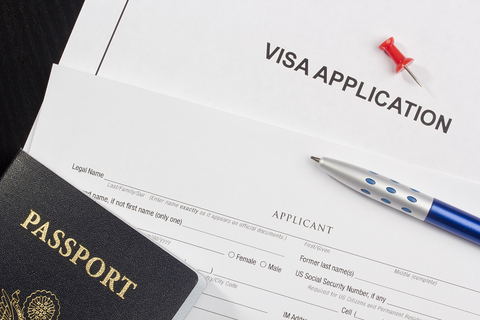
The third threat to your hard-earned travel savings at land border crossings are the opportunists who try to assist you in filling out application forms.
If an individual attempts to assist you in filling out your visa-on-arrival application form or any other required forms, you should politely decline.
These people will often pretend to be helping you out of purely altruistic motives and then they’ll suddenly hit you with a bill after the form has been filled out. This could lead to a major quarrel if you feel that the amount being demanded for the service is unreasonable (and it probably will be).
4. Never buy your visa before physically crossing over the border
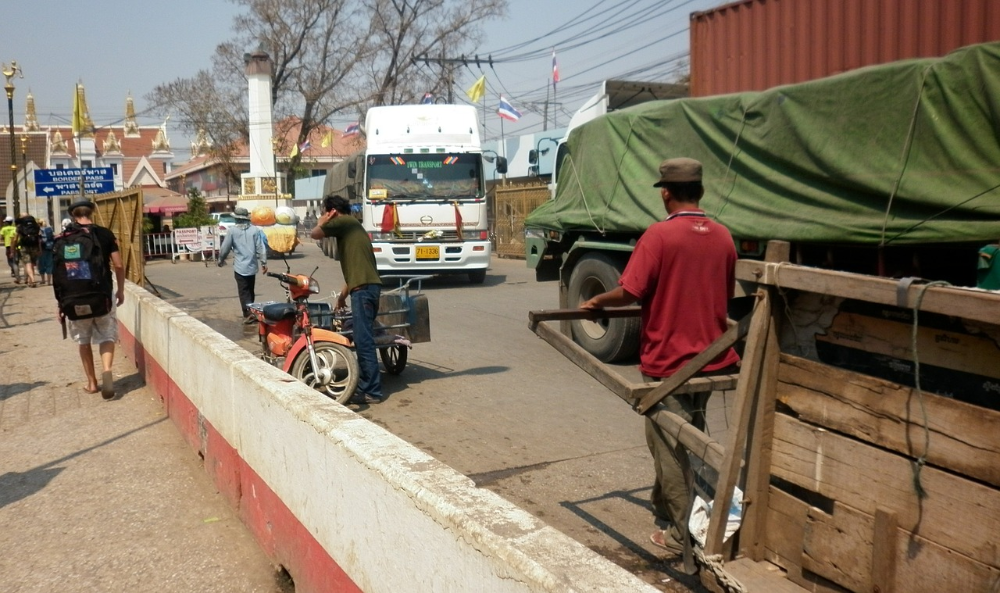
If you take a tuk-tuk from Aranya Prathet to the border, there's a good chance that you'll be brought to the Cambodian consulate in Thailand where you'll be pressured into buying your visa for a price of around 1400 - 1800 Thai Baht. This is equivalent to about $42 - 53, which is much higher than the official $30 visa-on-arrival fee. Don't fall for it!
Even if don't end up here at the Cambodian consulate by tuk-tuk, it's possible that you'll run into a few touts that will try to bring you there in an attempt to get you to buy the overpriced visa. Ignore all of these touts and proceed to exit Thailand.
Make sure you are stamped out of Thai immigration and have actually physically crossed over the border into Cambodia (the dramatic Khmer-style entranceway in the first image in this article marks the boundary) before you buy your visa-on-arrival. There will be an office some way beyond the official border where you'll probably see other tourists flocking in and out of.
Seeing that we don't know of any other border crossings where this scam occurs, we've just used the Poipet crossing as an example. But the rule should be applied everywhere as a precaution.
The unofficial visa fee scam
All the aforementioned scams are relatively easy to avoid but the principal border crossing scam and the one that is the most difficult to circumvent, is that of being forced to pay a bribe to the officials in order to have them process your visa-on-arrival.
This scam could potentially happen at any of the Southeast Asian countries that issue a visa-on-arrival at land border crossings to travellers, but from what we’ve experienced, it is most likely to happen to you if you are crossing over into Cambodia or Laos from any of the countries that those two countries share their borders with.
In theory, there is an official price that you should be asked to pay for your visa-on-arrival when entering these countries. For example, if you’re crossing over into Cambodia, the visa-on-arrival cost for most nationalities should be $30 exactly, no more no less.
But in practice, the immigration officials may demand that you pay more than that and sometimes they’ll demand a whole lot more.
The excuses for the extra amount that you are asked to pay vary from crossing to crossing; it might be a fee for the “Laos Tourism Fund", a visa processing fee, an "express" processing fee, a “just because we said so” fee or they might even try to make you pay the (higher) fee for a totally different visa, like the $37 e-visa fee that they try to make tourists pay at the Hat Lek – Cham Yeam border crossing.
Regardless of the reason or excuse given for the extra fees, the end result is always the same; travellers end up paying more for their visa than they officially should be paying and the greedy corrupt border officials line their pockets with the extra cash.
The remainder of this article is mostly dedicated to helping you deal with this principal problem of being demanded to pay extra bribe money to the border officials in order to get your visa processed.
#5 - Avoid taking "through-buses" when crossing land borders

Because it’s convenient, many travellers like to traverse land borders in Southeast Asia by taking a through-bus or minivan that begins its journey in one country, drives its passengers across the border and finally brings its passengers to a popular destination in the neighbouring country.
For example, you can take a bus from Bangkok all the way to Siem Reap in Cambodia or a 24-hour “bus from hell” from Hanoi in Vietnam to Luang Prabang in Laos. Minivans also ply some of these inter-country routes.
Once the vehicle reaches the border, it’ll make a brief stop for the travellers to sort out any visa-on-arrival that they might be required to get and get their passports stamped by the border officials, before again filling up with the same passengers and continuing on to the final destination in the new country.
While these buses and minivans are certainly very convenient and undoubtedly very tempting for travellers, you absolutely must eschew them if you want to stand a half-decent chance of not having to pay a bribe to the border officials.
The problem is that if you arrive at the border in a through-bus or minivan full with other travellers, 99% of your fellow travellers will not be willing to protest against paying unofficial fees.
They’ll just go with the flow, hand over the extra bribe money to the corrupt border officials and jump into the bus or minivan that’s waiting for them.
Then, while you’re still protesting about the scam, all the other travellers and the driver will be waiting impatiently for you inside the vehicle and probably shouting at you to hurry up and just pay the extra amount.
You know that if you continue to protest for much longer, there’s a good chance that the bus or minivan will just drive off without you. So you’re left with two choices.
Do you tell the driver that it’s okay for him to just drive off and then continue your protestations in the hope that the border officials will eventually concede to your stubbornness? Or do you pay the bribe money and not have to face the consequences of being abandoned by the vehicle at the border?
If you allow the vehicle to drive off without you, you will inevitably lose money, even if you subsequently manage to avoid paying a bribe to the border officials. This is because you already paid enough cash to be taken all the way through the border to your final destination and not just to the border.
Now you’re stuck at the border and will likely have to pay again for an alternative form of onward transport to your final destination, which could be very expensive, depending on the remoteness of the border crossing and the onward transport options that are available.
But if you just shrug your shoulders and pay the bribe money demanded by the border officials, then you also obviously lose money, with the degree of the loss dependent on the magnitude of the bribe being demanded.
Sometimes it might make more economic sense to let the bus or minivan drive off without you if you’re confident that further protestations will pay off, that onward transport costs from the border to your final destination are very low and if the bribe being demanded by the corrupt officials is particularly large.
Other times it might be economically wiser to just hand over the bribe money, especially if it’s a fairly trivial amount like $1 – 2 and not have to deal with the cost and hassle of finding onward transport after the bus or minivan that you arrived in has deserted you.
No matter what choice you make in this situation however, you clearly still end up a financial loser. You’re damned if you do and damned if you don’t. That is why it is essential not to take buses or minivans through land border crossings if you want to be sure to avoid unnecessary financial loss.
#6 - Arrive at the border checkpoint as early in the day as possible
.jpg)
The feat of sidestepping a long established, deeply entrenched border scam that succeeds with almost every traveller that it’s tried on, usually requires some time and patience.
The border officials will rarely concede immediately to your protestations and it’s almost certain that they will initially dismiss you or ask you to wait nearby if you refuse to pay the bribe.
So you shrug your shoulders with indifference and retreat to a seat somewhere nearby. Maybe an hour passes, maybe more, maybe less, but eventually you get called back by one of the officials and who is now suddenly willing to process your visa and stamp you in. At least, this is frequently how things pan out when a traveller successfully manages to avoid paying a bribe.
It’s obvious then that you should arrive sufficiently early in the day, so that you can employ the weapon of time. It’s normally only a matter of time and stubbornness before the border officials cave in. But if you reach the border checkpoint in the late afternoon, you may not have the advantage of time on your side.
Some border checkpoints close as early as 5 or 6 p.m in the evening and the border officials might pack up and head home before they’re ready to concede. So try figure out a way to get there early in the morning, thus giving yourself sufficient time to win this battle of wills.
#7 - Know you're in the right (both morally and with regard to the official fee(s))
One of the biggest issues that besets many travellers when they’re actually confronted with the real scenario is doubt about the official fees.
A traveller might have firmly resolved to not pay any bribe to the border officials beforehand, but in the actual heat of the battle, doubt suddenly creeps in and the traveller finds himself being swayed by the carefully crafted lies of the border officials.
For example, if you put up a protest at the Thai-Cambodia Hat Lek - border crossing, where the official visa-on-arrival fee is $30, the officials will produce a “press release” card that claims the price of the visa to be $37. However, this a press release for the e-visa and all they’ve done is conceal the letter “e” with Tip-Ex or similar.
One way to prevent doubt creeping in is to look up the official land border crossing fees on the country’s official Government website or other authoritative websites and to do this the night before you cross the border.
If you only look up the fees a week before you cross and one of the border officials tells you the fee has recently increased (which can and does happen), you might end up giving the man the benefit of the doubt. After all, if he actually was telling the truth and you put up a huge protest, it would be rather embarrassing.
Alternatively, if you have a data plan for your phone, you may be able to visit the relevant web page displaying the fees at the very time you reach the border checkpoint. This should help to dispel all doubt from your mind.
Another enemy that can crop up in the heat of the moment and spoil everything is a traveller’s conscience. Most of us are conditioned from a young age to not question authority, even if that authority is acting immorally or committing acts of injustice. In fact, many of us have been programmed to experience pangs of guilt whenever we oppose the authorities, even if we are in the right.
Similarly, we might also rationalize that these officials have a tough life, having to work an underpaid job at a remote border outpost like this, and that they deserve some extra “tips” from us privileged travellers.
While it may be true that these officials are underpaid for their jobs, they obviously take in a great deal of extra bribe money from travellers passing through, which surely more than compensates for that.
Supposing 100 travellers passed through a reasonably busy land border crossing on any given day and 99 of those paid a $5 bribe (a pretty typical amount) to get their passports stamped. That equates to $495 in earnings, which we’ll assume would be equally distributed between all the border officials. If there were five officials manning that particular border crossing, each would receive an additional daily wage of $99.
Since most land border crossing scams mainly benefit officials living in Laos, Vietnam or Cambodia, we’re talking an additional daily wage of $99 in countries where the average daily wage is around $3 - 5.
So these officials might earn anywhere from 20 to 30 times the average daily wage thanks to this scam. With the extremely low cost of living in these countries, it’s hard to rationalize that these officials need another bribe from you to get through the day.
The situation might be compared to that of some homeless people or panhandlers, who initially may have relied upon the donations of those who were better off, but who then began to accumulate a great deal of surplus money from the act of begging, so that eventually they ended up financially better off than many of their donors who were working full-time jobs.
So how do you deal with the enemy of a guilty conscience in this scenario? Well, that is a personal battle that you must confront. The guilt here arises from a dysfunctional belief you hold that what you’re doing is wrong.
You have to take a look at that silly belief and try to let it go. You might try to change the belief by attacking it with cold logic and rationality. And even if you can’t silence a guilty conscience, you must still try to act in spite of the uncomfortable feelings. Show your mind who is boss.
#8 - Only carry the exact amount for the visa, in the primary currency
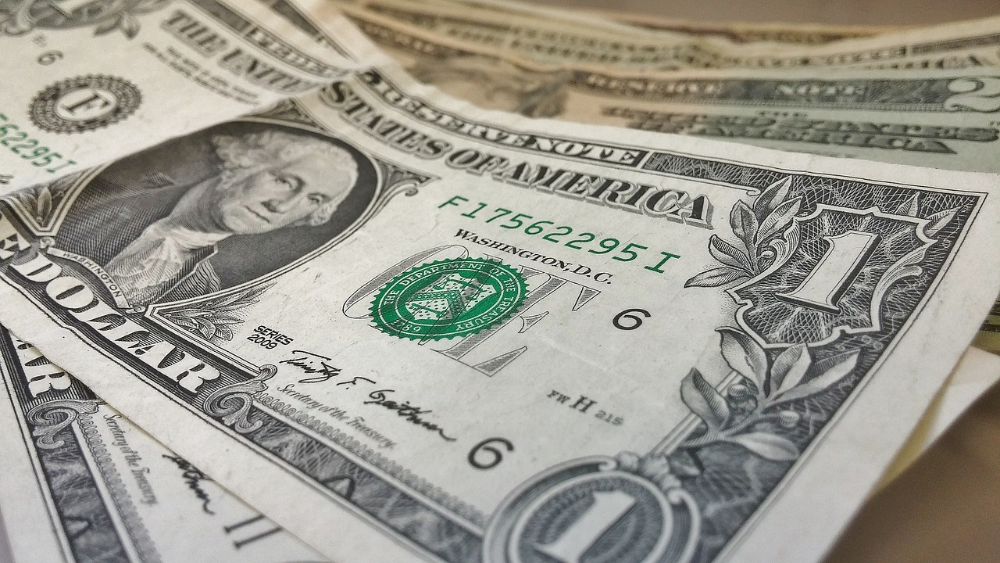
If there’s an official visa-on-arrival fee for the border crossing, make sure you only carry that exact amount in your wallet when you go to pay the fee. Any other cash that you have should be stashed away in your bags or out of the way.
If you’re paying a $30 fee to cross into Cambodia for example, make sure you have exactly $30, no more, no less, in your wallet or purse and won’t require change from a larger note.
The corrupt officials may be reluctant to give you back the correct change from a big note, even if they first agree to only charge you the official fee. Often they will "forget" to give you back your change unless you give them a stern look.
Unfortunately, it can sometimes be difficult to get a hold of notes that are smaller than $100 from the banks in countries like Thailand, Indonesia etc. Therefore give yourself plenty of time to get the right change prepared well before the day of the crossing.
Also, if you can open up your wallet and demonstrate that really do just have $30 exactly, they’ll be far more likely to let you through. Don’t give the officials any excuse to demand a bribe from you by revealing that you’re carrying extra cash.
Make sure you’re carrying the primary currency too. Many border officials will accept two currencies, a primary and secondary currency, but you’ll get an appalling exchange rate if you try to pay in the secondary currency.
For example, if you’re crossing over into Cambodia from Thailand at the Hat Lek crossing, the official visa-on-arrival fee is $30 but if you only have Thai Baht, you’ll likely be asked to pay 1,600 Baht as we were, which is actually more like $47.
#9 - Don't protest out loud in front of other travellers

Now is not the time to try to rally together an army or incite a rebellion against the Government.
If there are other tourists getting their visas at the same time as you, just allow them to go about their business and discreetly protest to the official(s) you’re dealing with, without deliberately making a scene so everybody knows what’s happening.
If the officials are already collecting plenty of bribe money from other travellers that day, they’ll probably be more likely to let you off the hook as long as you keep your mouth shut and don’t announce to the whole world that there’s a scam being perpetrated.
#10 - Maintain your composure and display indifference at all times
The last tip that we can give you when you’re protesting against the bribe you’re being asked to pay is to just keep your cool. Try not to get flustered or angry and don’t behave aggressively towards the border officials.
Losing control of your emotions will only hurt your chances of success and may even guarantee that you don’t get your way.
As we’ve already stated, your most powerful tools are patience, stubbornness and persistence, combined with following all the other tips we’ve laid out in this article.
#11 - Play the same game with any "exit bribes"
So you’ve made it past immigration without getting scammed. Phew. Unfortunately, your problems are often far from over. You may still need to make it out of the country (if overlanding again) without getting scammed.
Luckily, the phenomenon of the exit bribe seems to be less commonly encountered and is usually easier to evade.
We only personally encountered the exit bribe once and that was when we were crossing over into Laos from Cambodia at the Stung Treng border crossing station.
When we approached the counter, the officials at the Cambodian immigration booth refused to stamp our passports, stubbornly demanding that we pay a $2 stamping fee for the privilege.
After a stand-off lasting several minutes, the officers eventually realized that we were in no hurry to be anywhere and eventually conceded to our superior stubbornness, stamping us out of the country at no charge.
#12 - Beware of overpriced onward transportation from the border
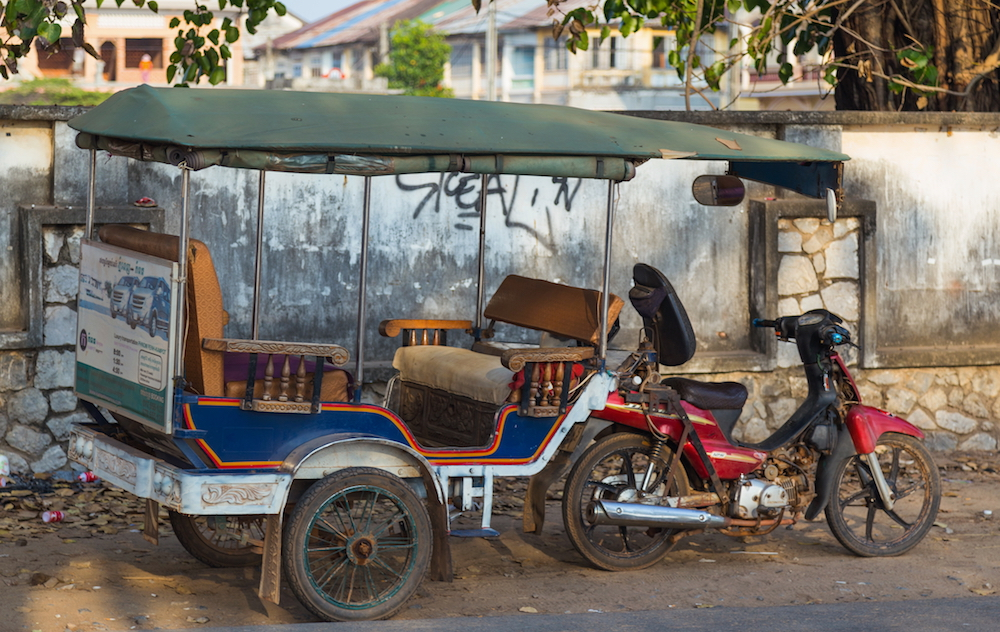
A lot of enterprising local taxi drivers and tuk-tuk drivers make a killing from driving stranded travellers away from the borders to the nearest town.
Usually travellers are pretty desperate to get to a hotel after crossing the border so they end up paying exorbitantly for what might only be a short journey.
Also, many travellers overpay because they get led into a trap where they are denied knowledge of the cheaper transport options that are available.
For example at the Aranya Prathet - Poipet, Thai - Cambodia border crossing, after obtaining their visas from the immigration counter, tourists are aggressively herded onto a free shuttle bus that takes them to the Poipet Tourist Passenger International Terminal.
This is the tourist bus station where buses on to Siem Reap are much more expensive than the other non-tourist local buses ($9 vs $5). The food here is also overpriced so that you incur further losses while waiting for your bus.
If you can avoid this shuttle bus and keep walking, you should be able to avoid the transport monopoly and arrange cheaper onward transport to Siem Reap by means of a pickup truck or by buying a non-tourist bus ticket from one of the operators stationed along the main street.
In Wikitravel's Poipet guide (highly recommended reading), they also suggest taking the free shuttle bus to get out of town at no cost and then hitchhiking on from there for a fraction of the cost of a bus or taxi (you may have to pay a small amount of compensation to the driver) to wherever you want to go.
In general you can avoid becoming a victim of onward transport scams by doing plenty of research on the specific border crossing you'll be travelling to beforehand and by seeking out up-to-date information on what the prices for each means of transport should be.
Up-to-date guidebooks like Lonely Planet can be very helpful for this sort of information, as can resources like Travelfish, Wikitravel and various online travel forums.
It's also extremely important to haggle for a lower fare at most of these crossings, because the drivers will usually be looking to extract the maximum possible profit from you. We have a whole article dedicated to helping you refine your negotiating skills.
Don't get caught out with the wrong currency either, as you'll find that if a country (like Cambodia) uses two currencies, one is usually going to be cheaper to pay for onward transport with.
If crossing over into Cambodia for example, always have a few American dollars handy, or you could get caught out and have to pay more if you only have Thai baht or some other currency.
We recently knocked a hundred baht ($3) or so off the price for a taxi ride from the Thai-Cambodian border to the small town of Koh Kong 8 km away, because we were persistent in resisting the taxi driver’s less than attractive offers.
In fact, the driver even started throwing a tantrum and was trying to make us feel guilty because just prior he had “helped” us to get our visa processed without our having to pay a bribe.
Later he tried to punish us for the reduced fare (which he agreed to) for the journey, as he was obviously used to extracting a lot more profit from travellers and was overcome with anger.
His "punishment" was to deliberately drop us rather inconveniently at the town’s main bus station, which was located about 1.5 km outside the town, meaning that we had to walk for about 15-20 minutes to get back into town before finding a guesthouse.
A final word
We know that this has probably been a lot of information to take in about something that really shouldn't be quite so complicated.
But when it comes to avoiding these border scams, you can never know too much, as these con-artists are always devising new and better schemes to outsmart travellers.
In truth, it's mostly new travellers that get scammed at the border crossings anyway because they haven't read through resources like this and aren't experienced enough to know all the common pitfalls.
With all this information under your belt, you should have a much higher chance of emerging unscathed from even the most scam-prone border crossings, than perhaps 95% of other travellers.
What's more, by implementing these tips whenever you cross the borders, you'll have played your part in resisting corruption and that's something to be admired.
If you enjoyed this article, please share it with other travellers. Have you any other advice for avoiding land border crossings in Southeast Asia? Please let us know in the comment section below.
JOIN OUR LIST
SUPPORT US
FOLLOW US
ABOUT US
Our names are Eoghan and Jili and we hail from Ireland and India respectively.
We are two ardent shoestring budget adventure travellers and have been travelling throughout Asia continuously for the past few years.
Having accrued such a wealth of stories and knowledge from our extraordinary and transformative journey, our mission is now to share everything we've experienced and all of the lessons we've learned with our readers.
Do make sure to subscribe above in order to receive our free e-mail updates and exclusive travel tips & hints. If you would like to learn more about our story, philosophy and mission, please visit our about page.
Never stop travelling!
FOLLOW US ON FACEBOOK
FOLLOW US ON PINTEREST
-lw-scaled.png.png)

